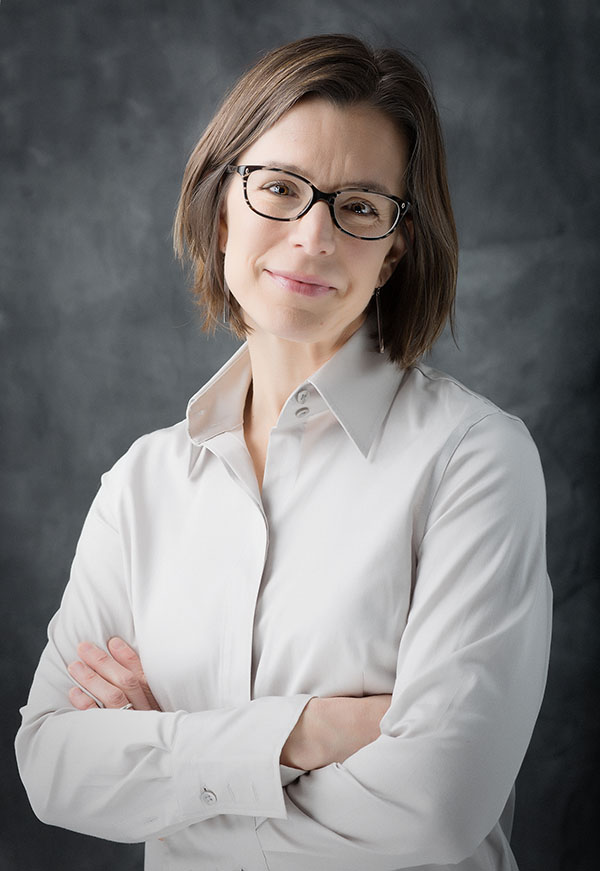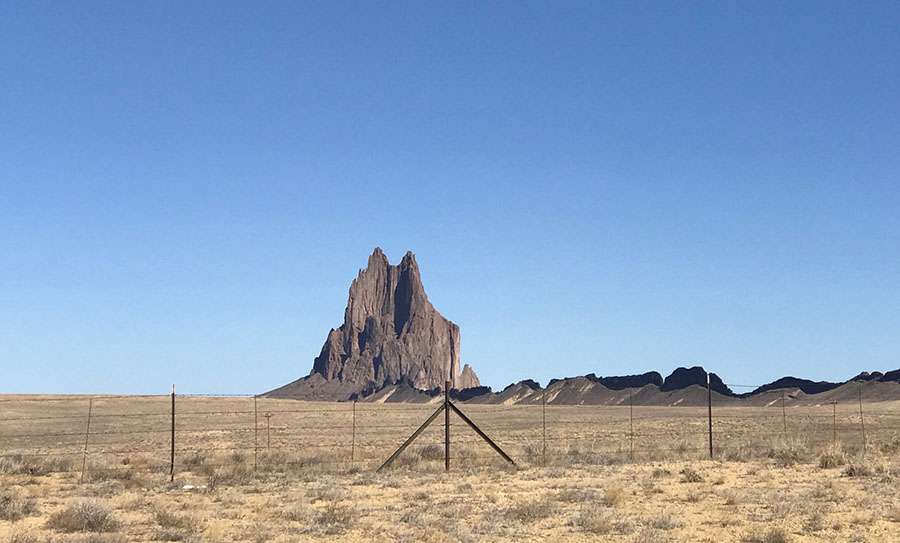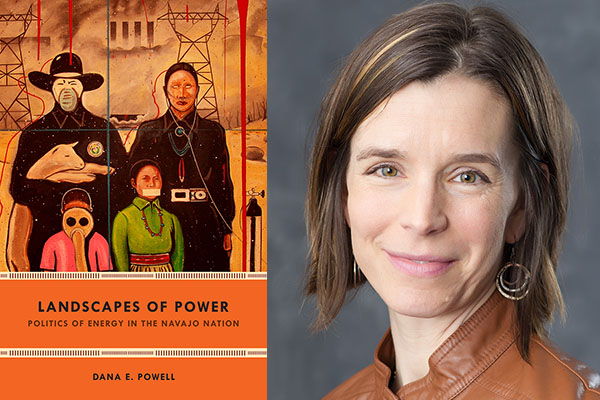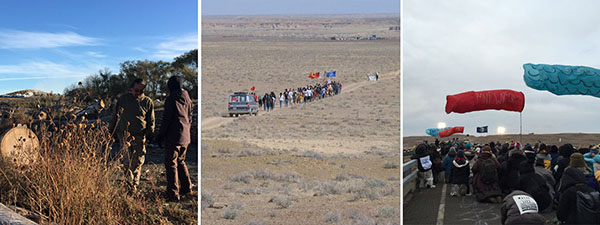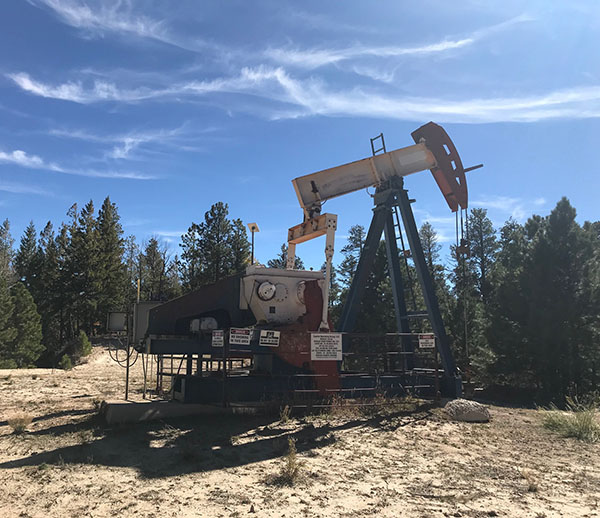
This photo, taken in October 2018, shows helium well pads in the Chuska Mountains of the Navajo Nation. Powell said, when she toured these “largely hidden (helium well) sites” in October 2018, concerned citizens shared with her “their fears of exposure to contamination, and how these layered risks are compounded by the impact of drought and extractive industry, in the wider region.” Photo by Dana Powell
BOONE, N.C. — Dr. Dana E. Powell, assistant professor in the Department of Anthropology at Appalachian State University, is one of seven scholars in the United States and Canada selected for a Cornell University Society for the Humanities (SOH) Fellowship for the 2019–20 academic year. As part of the one-year fellowship, Powell will receive $50,000 in grant funding.
The theme of the 2019–20 fellowship is “Energy” — the fellows’ research projects must “reflect on the theme of energy, its past, present, and futures,” according to the Cornell University SOH website. Fellows spend the academic year in research and writing, participate in the weekly Fellows Seminar and offer one seminar course at Cornell that is related to their research.

This photo, taken in October 2018, shows helium well pads in the Chuska Mountains of the Navajo Nation. Powell said, when she toured these “largely hidden (helium well) sites” in October 2018, concerned citizens shared with her “their fears of exposure to contamination, and how these layered risks are compounded by the impact of drought and extractive industry, in the wider region.” Photo by Dana Powell
Powell said her environmental humanities project, titled “Redesigning Diné Energy: Water and the Transition Imagination,” will advance scholarly understandings of the differential lived experiences of the Anthropocene (the current geological age) and contribute to ongoing research collaborations she maintains with Navajo (Diné) political ecologists and activists.
She said she is particularly compelled by the way Diné people are responding to climate change in their region, including how they are grappling with the impending closure and redesign of a 2,250-megawatt coal plant on the Navajo Nation that powers the redirection of 1.5 million-acre feet of water from the Colorado River annually. This and other rivers will figure centrally in her analysis.
“The moment is ripe for fresh understandings of how the infrastructures of energy colonialism continue to shape, and be resisted by, Diné people,” Powell said. “Documenting experiences of past, present and various possible futures — including how to build different kinds of infrastructural worlds — is one critical angle that cultural anthropology and ethnography offer to these longstanding movements for environmental and social justice.”
During the fellowship period, Powell plans to write an article that lays out the theoretical framework for a new book project she aims to undertake, focusing on the sociocultural dynamics of the contemporary energy–water–climate nexus in the Navajo Nation. This work follows her first book, “Landscapes of Power: Politics of Energy in the Navajo Nation” (Duke University Press, 2018).
“I have had the immense privilege as a non-Native scholar to work in this area for many years and am grateful for the opportunity the Cornell Fellowship allows, to deepen my collaborative research with Diné intellectuals and leaders working on these issues,” she said.
“The new project will explore multiple meanings of water, as it relates to energy in contemporary Diné life — as conduit of sovereignty (as ‘rights’), subjectivity (as ‘protectors’) and in everyday social practice (the wider moral economy of hauling, sharing and conserving),” she explained.
Powell continued: “I speculate that, through different local imaginings of how to repurpose aging energy infrastructures on the reservation, Diné citizens are re-evaluating both the legal and cultural significance of water as the central materiality of tribal sovereignty and their own embodied vitality,” she said. “So greatly has energy marked water in the Diné experience, that revitalization movements in the region cannot speak of one without the other.”
To complete the research, Powell explained she will draw upon her own ethnographic research in the Navajo Nation, as well as public debates, published literature and national archives to follow the unfolding of what scholars are calling “transition imaginations.”
“In the Nation’s uneven terrain of infrastructural excess (radioactive uranium tailings piles, coal plant cooling ponds, oil and gas wells and transmission lines) paired with infrastructural lack (one-third of Diné reservation households lack indoor plumbing and electricity), water is simultaneously dangerous and desired, often estranging place-based peoples from their customary territories,” she said.
Powell added, “The project’s urgency hinges upon the ‘slow violence’ (Rob Nixon, 2011) of environmental risk and climate change, bringing legacies of local energy extraction and more recent global climatic shifts into stark relief, in the U.S. Southwest.”
What do you think?
Share your feedback on this story.
About the Department of Anthropology
The Department of Anthropology offers a comparative and holistic approach to the study of the human experience. The anthropological perspective provides a broad understanding of the origins as well as the meaning of physical and cultural diversity in the world — past, present and future. Learn more at https://anthro.appstate.edu.
About the College of Arts and Sciences
The College of Arts and Sciences (CAS) at Appalachian State University is home to 17 academic departments, two centers and one residential college. These units span the humanities and the social, mathematical and natural sciences. CAS aims to develop a distinctive identity built upon our university's strengths, traditions and locations. The college’s values lie not only in service to the university and local community, but through inspiring, training, educating and sustaining the development of its students as global citizens. More than 6,800 student majors are enrolled in the college. As the college is also largely responsible for implementing App State’s general education curriculum, it is heavily involved in the education of all students at the university, including those pursuing majors in other colleges. Learn more at https://cas.appstate.edu.
About Appalachian State University
As a premier public institution, Appalachian State University prepares students to lead purposeful lives. App State is one of 17 campuses in the University of North Carolina System, with a national reputation for innovative teaching and opening access to a high-quality, cost-effective education. The university enrolls more than 21,000 students, has a low student-to-faculty ratio and offers more than 150 undergraduate and 80 graduate majors at its Boone and Hickory campuses and through App State Online. Learn more at https://www.appstate.edu.
